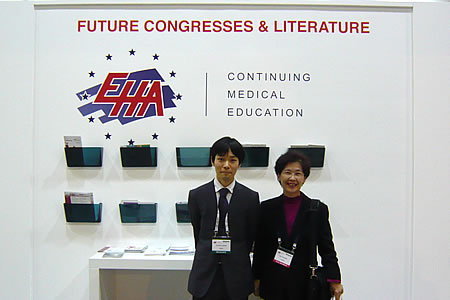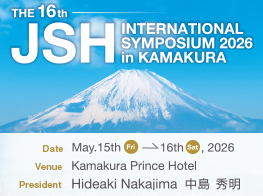名前:吉田 健一【東京大学医学部付属病院 がんゲノミクスプロジェクト】
発表日時:2011年6月12日
発表形式:oral
Title:
Whole exome analysis of myelodysplastic syndromes
Abstract:
Background:
Myelodysplastic syndromes (MDS) are heterogeneous groups of myeloid neoplasms characterized by multi-lineage cytopenias of varying degrees and transition to acute myeloid leukemia (AML). At present, no curative therapeutics for MDS has been established except for allogeneic hematopoietic stem-cell transplantation, which is not applicable to the majority of the MDS patients due to their higher ages. Thus, to improve the outcome of MDS, it is essential to develop novel therapeutic agents with both high efficacy and low toxicity, and to this goal, the discovery of the key molecules for MDS pathogenesis is of particular importance. To date, a number of gene mutations have been identified and implicated in the pathogenesis of MDS, including NRAS, TP53, RUNX1, c-CBL, TET2, ASXL1, and more recently, IDH1, IDH2 and EZH2. However, in view of therapeutic targets, our current knowledge of disease causing mutations in MDS is still incomplete.
Recently, high-throughput sequencing technologies have been shown to be effective for the identification of disease-related gene and been successfully used to determine the genetic basis of some neoplastic disorders, such as AML and diffuse large B-cell lymphoma. More recently, the resequencing technology targeted for all protein-coding subsequences (i.e., whole exome analysis) has enabled cost-effective comprehensive mutation analysis of coding sequences.
Aims:
In this study, to obtain a complete registry of genetic lesions in MDS and to identify novel therapeutic targets, we performed whole exome analysis for novel mutations using high-throughput sequencing technologies, combined with large-scale screening of mutations in candidate genes using barcode-labeled DNA for a panel of ~180 MDS samples. Methods: Whole exome analysis was performed for 20 MDS samples, where entire exon sequences were enriched by using SureSelect Human All Exon kit (Agilent Technologies) and were subjected to resequencing analysis using Genome Analizer IIx (Illumina).
Results:
More than 60% of mapped reads contained exon sequences. > 80% of exons were sequenced at the depth of >20 with average fold-coverage of >50 times. Given that the constitutive genomic DNA was difficult to obtain in MDS patients, paired CD3-positive T cells were used as a normal control. By comparing sequences in tumors and paired T cells, nearly 200 somatic mutations and 10 insertions-deletions were detected in the whole exome analysis. Novel gene targets were also explored by resequencing barcord-labeled DNAs from 180 MDS specimens, which targeted 80 candidate genes for MDS. A number of mutations were identified, including those in IDH2, ASXL1, TET2, EZH2 and novel target genes such as PHF6, which has been reported to be mutated in T-ALL previously, and other genes which have not been reported to mutated in human cancers. Nearly 3 mutations per sample were detected and multistep model of oncogenesis in MDS were revealed.
Summery / Conclusions:
Our results suggested that target-capture resequencing technology is a powerful method to identify new gene mutations that are implicated in the pathogenesis of MDS.
EHA congress 印象記:
今回、2011年6月9日から12日までロンドンで開催された第16回ヨーロッパ血液学会に参加させていただきました。学会は市の中心部よりやや東側にあるExcel Londonという会議場で開催され、ASHほどではないもののアジアからの参加者も多くみられましたが、震災の影響もあってか日本人の参加者はあまり多くない印象でした。会期中は晴れの日が多く、ロンドンらしくないなと思っていましたが、一度だけひょう(雹)が降ってびっくりしました。
私が今回EHAで発表した演題は、次世代シーケンサーを用いてMDSの全エクソンシーケンスを行ったというもので、32症例のMDSおよび関連疾患の解析でこれまでに報告されているTET2、TP53、RAS、CBL、IDH、ASXL1、DNMT3Aなどの遺伝子変異に加えて、多くのこれまでに報告がなかった遺伝子変異が発見されたということを報告しました。
発表は最終日だったので、それまでは自分の研究しているMDSなどの骨髄性腫瘍やゲノム解析などのセッションを中心に聴いてまわりました。EHAのプログラムの特徴としては教育講演がとても充実していて、同じテーマのセッションが1日2回あり、なるべく多くの人が聴けるように配慮されているようでした。また、教育講演ではその研究ではとても有名な先生方が話されるので、これまでのreviewはもちろん、まだ発表されていないデータが出ることもあるので、とても興味深いものが多くありました。MDSの教育講演のBiologyの部門では、MDS439症例について100以上の遺伝子の変異を調べ、TP53、EZH2などの遺伝子変異が予後不良因子であることを示されていて、とてもきれいなデータだと思いましたが、その後Harvard大学のグループからNew England Journal of Medicineの6月30日号に報告されました。
また、Best Abstractのセッションでは、Hairy cell leukemiaの1症例で全エクソンシーケンスを行ったところ、BRAFのV600E変異がみつかり、他に48例のHCLでもSangerシーケンスで調べたところ、全例に同じBRAF V600E変異が見つかったという驚くべき報告がされました。また、この演題は発表当日にNew England Journal of Medicineに掲載されたということでした。
今回のEHAではいろいろな先生方と交流する機会がありました。今回EHAに参加されていた日本からの先生方とお話しする機会もあり、日頃接点がなかった自分の研究室以外の先生方とお話しできたのはとても刺激になりました。また共同研究でお世話になっている台湾のChang Gung大学のLee-Yung Shih先生と会うことができ、日頃の感謝の気持ちを伝えることができました(写真)。
最後になりましたが、このような素晴らしい機会を与えてくださった日本血液学会国際委員会、事務局の皆様に心より感謝いたします。




